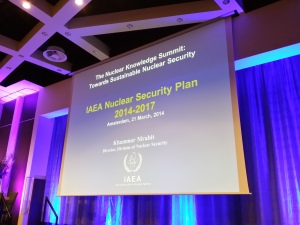==========================================================
Why Foreign Fighters are Joining ISIL (Part 3 of 3)
The Huffington Post
By: Robert D. Onley - October 16, 2014
Part 3 of 3 in a series. Read Part 1 and Part 2.
Defeating ISIL and its ideology
For peaceful democratic societies, the challenge is this: how do you stop a destructive force like ISIL, one which cherishes death? How do you convince the globe's Islamic radicals, and ISIL in particular, that life -- for its fighters, supporters, and its persecuted victims -- is in fact far better than death? Or is the only choice for Western and civilized societies one that grants these deranged men their wish, through laser-guided swift deaths which kill as many ISIL fighters as possible? As civilized nations which value the preservation of life, reaching this conclusion is as disturbing as recognizing the stark reality that it is in fact the only option.
Once more in fulfilling its role as the vanguard of global liberty, the United States has led air strikes against ISIL fighters in Iraq and Syria in support of advancing Kurdish Peshmerga soldiers. In spite of President Obama's reticence in doing so, the United States government understands that the only way to stop the physical military advance of ISIL fighters is to use military force in kind. Defense Secretary Chuck Hagel is one of the few American leaders to public comment on ISIL's End Times goals, when he acknowledged that:
"[The Islamic State] is an organization that has an apocalyptic, end-of-days strategic vision which will eventually have to be defeated."Hagel further added that ISIL is:
"...beyond just a terrorist group. They marry ideology, a sophistication of ... military prowess... [that] is beyond anything we've seen."As world leaders express their horror at ISIL's tactics, unrelenting oppression and brutality toward religious minorities, few leaders or media commentators have assessed why it is that such an evil group can recruit so many new soldiers -- and foreign fighters -- to begin with. Thus the need for a public discussion about Islamic End Times beliefs has never been greater.
Wake up to ISIL's End Times beliefs now
In attempting to understand this global enemy, Western leaders would be wise to consider the role that their governments must play in halting ISIL's End Times goals and in preventing the long-term survival of an "Islamic State."
ISIL fighters are under no illusion about what their ultimate objective is: to usher in the Islamic "End Times". Thus Western leaders and military planners must be equally convicted about their goals. President Obama's overdue assertion that ISIL "will be defeated" was a welcome show of Western resolve. ISIL territory cannot become a national safe haven for terrorists, and moreover the West cannot permit the theological notion that Caliph Ibrahim has in some way fulfilled the Qur'an's prophecies concerning the Islamic End Times. Indeed there is no doubt that the entire global Islamic community is watching to see whether ISIL will be defeated in Syria and Iraq.
It is ISIL's End Times beliefs and the urgency of their battlefield success which has inspired the growth of the terrorist organization. Unless stopped now, the terror group only has the potential to grow larger, fiercer, and more determined in achieving Allah's Judgment Day vision. Western foreign policy commentators must break out of their comfort zones and begin to speak publicly about the genuinely religious nature of the ISIL threat and against the beliefs which drive the movement.
Simply claiming that ISIL's acts are "un-Islamic" does nothing to respond to the deeply prophetic Islamic agenda that ISIL espouses. ISIL is an enemy clearly communicating its aims, blatantly using the Qur'an as its guiding doctrine. Rather than gloss over this fact, the foreign policy world needs its brightest lights to expose this doctrine and overpower its distorted message in response.
Providing proper analysis and with due regard for the sincere religious beliefs of hundreds of millions of Muslims who do not seek to create a revived Islamic Caliphate under the repressive purview of Sharia law, it is possible to initiate global dialogue about the reality of ISIL's End Times goal, with candor, clarity and objectivity. Millions of lives are at stake in a battle that has already claimed countless innocent human beings. After the call from the UN for a humanitarian aid mission in Iraq, the international community has admitted that what was perhaps at first a domestic Iraqi counter-terror operation is now a global religious freedom and a human rights crisis which threatens to envelop more people and draw in ever more militant forces.
With the civil war festering in Syria claiming 200,000 lives, the two-month conflict between Israel and Hamas still smoldering, worsening strife in Libya and Pakistan, and ISIL's rampage across Iraq and Syria, the world is steadily marching toward an Islamist-driven End Times nightmare with global ramifications.
Stop for a moment to consider the intellectual weight of ISIL's extreme belief system: potentially hundreds of thousands of otherwise normal men have become "foreign fighters" who are convinced that a martyr's death in the cause of Allah offers a ticket to Jannah (Islamic heaven), a ticket upon which they are granted permission by their God to perpetrate the most grotesque violence imaginable in order to expedite the Qur'an's prophesied "End Time". President Obama rightly condemned this horror when he stated at the UN General Assembly that "no God condones this terror."
But not since Adolf Hitler's Mein Kampf failed at establishing the Third Reich has the earth witnessed the murderous power of a single doctrine to unite tens of thousands of men toward executing terrifying plans of ideological and territorial conquest. It is imperative that the West understands the ideological threat posed by ISIL's End Times theology and knows how to stop both its fighters and the radicalized foreigners ready to join them. Otherwise these will indeed be the End Times for far too many people to come.
-------






